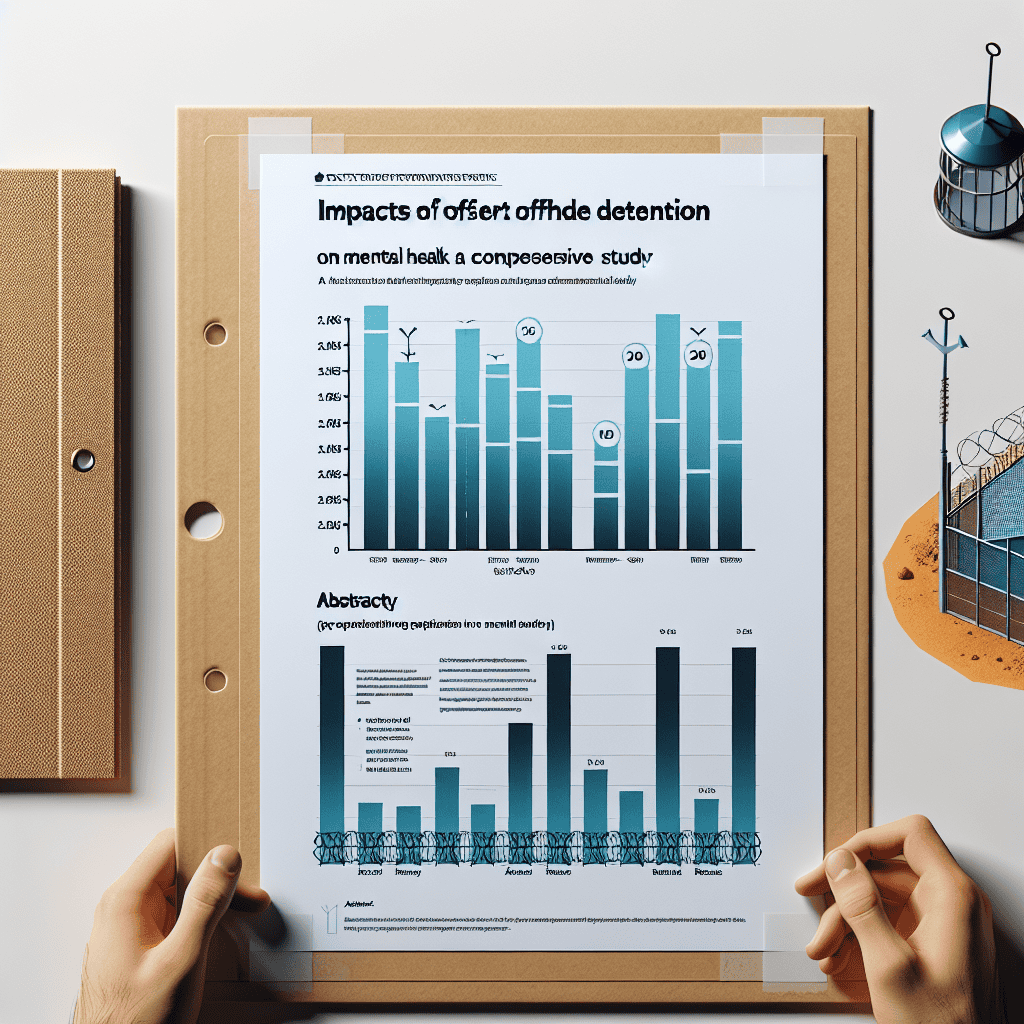Study Reveals Offshore Detention Increases PTSD Risk by 20 Times

In recent years, the global refugee crisis has prompted many countries to adopt stringent immigration policies, including the use of offshore detention centers. These facilities, often located in remote areas, are designed to process asylum seekers and refugees outside the mainland. However, a groundbreaking study has revealed that individuals held in offshore detention are at a significantly higher risk of developing post-traumatic stress disorder (PTSD), with the risk increasing by 20 times compared to those processed onshore. This article delves into the findings of the study, exploring the psychological impact of offshore detention, the conditions within these centers, and the broader implications for human rights and international policy.
The Psychological Impact of Offshore Detention
The psychological toll of detention on asylum seekers and refugees has been a subject of concern for mental health professionals and human rights advocates alike. The recent study, conducted by a team of psychologists and sociologists, provides empirical evidence of the severe mental health consequences associated with offshore detention.
Offshore detention centers are often characterized by their isolation and lack of adequate facilities. Asylum seekers are held in these centers for extended periods, sometimes for years, with limited access to mental health services. The study found that the prolonged uncertainty and lack of autonomy experienced by detainees contribute significantly to the development of PTSD.
PTSD is a mental health condition triggered by experiencing or witnessing a traumatic event. Symptoms include flashbacks, severe anxiety, and uncontrollable thoughts about the event. For asylum seekers, the trauma of fleeing conflict or persecution is compounded by the stress and uncertainty of detention. The study revealed that the prevalence of PTSD among detainees in offshore centers is alarmingly high, with many individuals exhibiting symptoms shortly after their arrival.
Moreover, the study highlighted the role of environmental factors in exacerbating mental health issues. The harsh conditions within offshore detention centers, including overcrowding, inadequate sanitation, and limited access to healthcare, contribute to a sense of hopelessness and despair among detainees. These conditions not only hinder recovery but also increase the risk of developing PTSD.
Case Studies: Personal Accounts from Detainees
To illustrate the psychological impact of offshore detention, the study included several case studies of individuals who have experienced detention firsthand. These personal accounts provide a poignant insight into the mental health struggles faced by detainees.
One such case is that of Ahmed, a 28-year-old asylum seeker from Syria. Ahmed fled his war-torn country in search of safety and a better life. However, upon reaching the shores of a Western country, he was transferred to an offshore detention center. Ahmed described his time in detention as a “living nightmare,” marked by constant fear and uncertainty. He reported experiencing frequent flashbacks of his journey and the violence he witnessed in Syria, exacerbated by the harsh conditions of the detention center.
Another case study involved Maria, a 35-year-old mother from El Salvador. Maria fled her home country with her two young children to escape gang violence. Upon arrival, they were placed in an offshore detention center, where they remained for over a year. Maria recounted the emotional toll of detention on her family, particularly her children, who struggled to cope with the lack of stability and routine. She described feeling powerless and overwhelmed, with her mental health deteriorating over time.
These case studies underscore the urgent need for reform in the treatment of asylum seekers and refugees. The psychological impact of offshore detention is profound, with long-lasting effects on individuals and families.
Conditions Within Offshore Detention Centers
The conditions within offshore detention centers have been widely criticized by human rights organizations and international bodies. These facilities are often located in remote areas, far from public scrutiny, and are characterized by their lack of adequate resources and infrastructure.
One of the primary concerns is the overcrowding within these centers. Many facilities are operating beyond their capacity, with detainees living in cramped and unsanitary conditions. This overcrowding not only poses health risks but also exacerbates the psychological stress experienced by detainees.
In addition to overcrowding, detainees face limited access to basic necessities such as clean water, nutritious food, and healthcare. Reports have highlighted instances of malnutrition and preventable illnesses within these centers, further contributing to the physical and mental health challenges faced by detainees.
The lack of access to mental health services is another significant issue. Many offshore detention centers do not have qualified mental health professionals on staff, leaving detainees without the support they need to cope with their trauma. This lack of support is particularly concerning given the high prevalence of PTSD and other mental health disorders among detainees.
Furthermore, the isolation of offshore detention centers makes it difficult for detainees to maintain contact with the outside world. Communication with family members and legal representatives is often restricted, adding to the sense of isolation and helplessness experienced by detainees.
International Criticism and Calls for Reform
The conditions within offshore detention centers have drawn widespread criticism from international organizations and human rights advocates. The United Nations High Commissioner for Refugees (UNHCR) has repeatedly called for an end to the use of offshore detention, citing the detrimental impact on the mental and physical well-being of detainees.
Amnesty International has also condemned the conditions within these centers, describing them as “inhumane” and “degrading.” The organization has called on governments to prioritize the rights and dignity of asylum seekers and refugees, urging them to explore alternative solutions to detention.
In response to mounting criticism, some countries have taken steps to improve conditions within offshore detention centers. However, progress has been slow, and significant challenges remain. The study’s findings underscore the urgent need for comprehensive reform to address the systemic issues within these facilities.
The Broader Implications for Human Rights
The use of offshore detention raises significant human rights concerns, particularly in relation to the treatment of asylum seekers and refugees. The study’s findings highlight the need for a reevaluation of current policies and practices to ensure compliance with international human rights standards.
One of the key human rights issues associated with offshore detention is the right to seek asylum. Under international law, individuals have the right to seek asylum from persecution and to have their claims processed fairly and efficiently. However, the use of offshore detention often results in prolonged delays and a lack of transparency in the processing of asylum claims, undermining this fundamental right.
Moreover, the conditions within offshore detention centers may violate the prohibition against torture and cruel, inhuman, or degrading treatment or punishment. The psychological and physical harm experienced by detainees, as documented in the study, raises serious concerns about the compliance of these facilities with international human rights standards.
The study also highlights the need for greater accountability and oversight of offshore detention centers. The remote location of these facilities often shields them from public scrutiny, making it difficult to monitor conditions and hold authorities accountable for human rights violations.
Policy Recommendations and Future Directions
In light of the study’s findings, there is a pressing need for policy reform to address the human rights concerns associated with offshore detention. Several recommendations have been put forward by human rights organizations and experts in the field.
- First, there is a need for greater transparency and accountability in the operation of offshore detention centers. This includes regular monitoring and reporting on conditions within these facilities, as well as independent oversight to ensure compliance with international human rights standards.
- Second, governments should explore alternative solutions to detention, such as community-based processing and support programs. These alternatives have been shown to be more humane and cost-effective, while also ensuring the rights and dignity of asylum seekers and refugees.
- Third, there is a need for increased investment in mental health services for asylum seekers and refugees. This includes providing access to qualified mental health professionals and support programs to help individuals cope with trauma and rebuild their lives.
- Finally, there is a need for greater international cooperation and solidarity in addressing the global refugee crisis. This includes sharing responsibility for the protection and resettlement of refugees, as well as addressing the root causes of displacement.
Conclusion: A Call for Change
The study revealing the increased risk of PTSD among individuals in offshore detention centers serves as a stark reminder of the urgent need for reform in the treatment of asylum seekers and refugees. The psychological impact of detention, coupled with the harsh conditions within these facilities, raises serious human rights concerns that cannot be ignored.
As the global community grapples with the challenges of the refugee crisis, it is imperative that governments prioritize the rights and dignity of those seeking safety and protection. This includes reevaluating current policies and practices, exploring alternative solutions to detention, and ensuring compliance with international human rights standards.
The findings of the study underscore the need for a compassionate and humane approach to asylum and refugee policy, one that recognizes the inherent dignity and worth of every individual. By working together, we can create a more just and equitable world for all.





